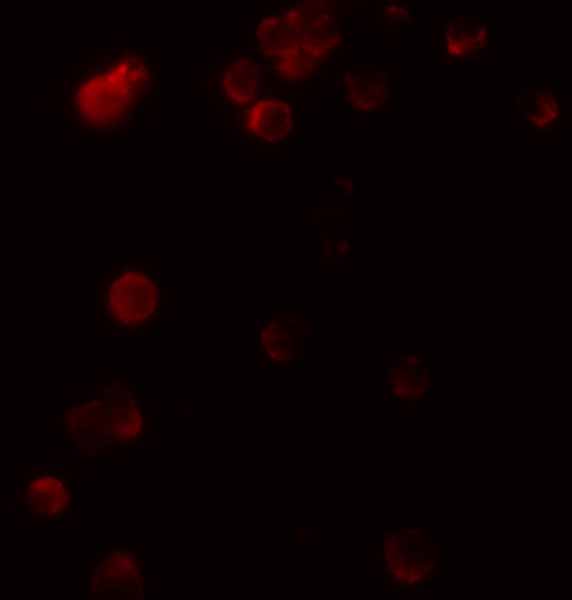SPT1 Antibody
- SPECIFICATION
- CITATIONS
- PROTOCOLS
- BACKGROUND

Application
| WB, IHC-P, E |
|---|---|
| Primary Accession | O15269 |
| Other Accession | NP_6406, 10558 |
| Reactivity | Human |
| Host | Rabbit |
| Clonality | Polyclonal |
| Isotype | IgG |
| Calculated MW | 52744 Da |
| Application Notes | SPT1 antibody can be used for detection of SPT1 by Western blot at 1 μg/mL. Antibody can also be used for immunohistochemistry starting at 5 μg/mL. |
| Gene ID | 10558 |
|---|---|
| Target/Specificity | SPT1 antibody was raised against a 17 amino acid synthetic peptide near the carboxy terminus of human SPT1. The immunogen is located within amino acids 380 - 430 of SPT1. |
| Reconstitution & Storage | SPT1 antibody can be stored at 4℃ for three months and -20℃, stable for up to one year. As with all antibodies care should be taken to avoid repeated freeze thaw cycles. Antibodies should not be exposed to prolonged high temperatures. |
| Precautions | SPT1 Antibody is for research use only and not for use in diagnostic or therapeutic procedures. |
| Name | SPTLC1 |
|---|---|
| Synonyms | LCB1 |
| Function | Component of the serine palmitoyltransferase multisubunit enzyme (SPT) that catalyzes the initial and rate-limiting step in sphingolipid biosynthesis by condensing L-serine and activated acyl-CoA (most commonly palmitoyl-CoA) to form long-chain bases. The SPT complex is also composed of SPTLC2 or SPTLC3 and SPTSSA or SPTSSB. Within this complex, the heterodimer with SPTLC2 or SPTLC3 forms the catalytic core (PubMed:19416851, PubMed:33558762). The composition of the serine palmitoyltransferase (SPT) complex determines the substrate preference (PubMed:19416851, PubMed:33558762). The SPTLC1-SPTLC2-SPTSSA complex shows a strong preference for C16-CoA substrate, while the SPTLC1- SPTLC3-SPTSSA isozyme uses both C14-CoA and C16-CoA as substrates, with a slight preference for C14-CoA (PubMed:19648650, PubMed:19416851). The SPTLC1-SPTLC2-SPTSSB complex shows a strong preference for C18-CoA substrate, while the SPTLC1-SPTLC3-SPTSSB isozyme displays an ability to use a broader range of acyl-CoAs, without apparent preference (PubMed:19648650, PubMed:19416851, PubMed:33558761, PubMed:33558762). Required for adipocyte cell viability and metabolic homeostasis (By similarity). |
| Cellular Location | Endoplasmic reticulum membrane; Single-pass membrane protein {ECO:0000250|UniProtKB:O35704} |
| Tissue Location | Widely expressed. Not detected in small intestine. |

Thousands of laboratories across the world have published research that depended on the performance of antibodies from Abcepta to advance their research. Check out links to articles that cite our products in major peer-reviewed journals, organized by research category.
info@abcepta.com, and receive a free "I Love Antibodies" mug.
Provided below are standard protocols that you may find useful for product applications.
Background
SPT1 Antibody: Serine palmitoyltransferase, which consists of two different subunits, is the key enzyme in sphingolipid biosynthesis. It converts L-serine and palmitoyl-CoA to 3-oxosphinganine with pyridoxal 5'-phosphate as a cofactor. SPT1 is the long chain base subunit 1 of mammalian serine palmitoyltransferase. SPT1 is not catalytically active but is necessary for the stabilization of the SPT2 subunit and anchoring the holoenzyme to the cytosolic face of the endoplasmic reticulum. Missense mutations in this gene have been identified in patients with hereditary sensory neuropathy type 1 (HSAN1). These mutations induce a shift in the substrate specificity of the holoenzyme, leading to the formation and accumulation of two neurotoxic sphingolipids.
References
Batheja AD, Uhlinger DJ, Carton JM, et al. Characterization of serine palmitoyltransferase in normal human tissues. J. Histochem. & Cytochem. 2003; 51:687-96.
Hanada K, Hara T, Nishijima N, et al. A mammalian homolog of the yeast LCB1 encodes a component of serine palmitoyltransferase, the enzyme catalyzing the first step in sphingolipid synthesis. J. biol. Chem. 1997; 272:32108-14.
Yasuda S, Nishijima N, and Hanada K. Localization, topology, and function of the LCB1 subunit of serine palmitoyltransferase in mammalian cells. J. Biol. Chem. 2003; 278:4176-83.
Penno A, Reilly MM, Houlden H, et al. Hereditary sensory neuropathy type 1 is caused by the accumulation of two neurotoxic sphingolipids. J. Biol. Chem. 2010; 285:11178-87.
If you have used an Abcepta product and would like to share how it has performed, please click on the "Submit Review" button and provide the requested information. Our staff will examine and post your review and contact you if needed.
If you have any additional inquiries please email technical services at tech@abcepta.com.













 Foundational characteristics of cancer include proliferation, angiogenesis, migration, evasion of apoptosis, and cellular immortality. Find key markers for these cellular processes and antibodies to detect them.
Foundational characteristics of cancer include proliferation, angiogenesis, migration, evasion of apoptosis, and cellular immortality. Find key markers for these cellular processes and antibodies to detect them. The SUMOplot™ Analysis Program predicts and scores sumoylation sites in your protein. SUMOylation is a post-translational modification involved in various cellular processes, such as nuclear-cytosolic transport, transcriptional regulation, apoptosis, protein stability, response to stress, and progression through the cell cycle.
The SUMOplot™ Analysis Program predicts and scores sumoylation sites in your protein. SUMOylation is a post-translational modification involved in various cellular processes, such as nuclear-cytosolic transport, transcriptional regulation, apoptosis, protein stability, response to stress, and progression through the cell cycle. The Autophagy Receptor Motif Plotter predicts and scores autophagy receptor binding sites in your protein. Identifying proteins connected to this pathway is critical to understanding the role of autophagy in physiological as well as pathological processes such as development, differentiation, neurodegenerative diseases, stress, infection, and cancer.
The Autophagy Receptor Motif Plotter predicts and scores autophagy receptor binding sites in your protein. Identifying proteins connected to this pathway is critical to understanding the role of autophagy in physiological as well as pathological processes such as development, differentiation, neurodegenerative diseases, stress, infection, and cancer.


